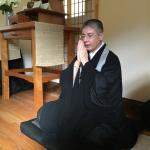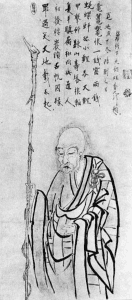
What about when you feel that you just can’t do it? When you’re beset with tight, bitter feelings. When you’ve been wronged? What is practice at just such a time?
Turns out that we’re not alone, of course, and that practitioners have long had these normal human feelings. If you’d like to dig deeply into these issues, this post is for you. It includes my translation of “Case 41: Luòpǔ With One Foot in the Grave” from the classic koan text, Record of Going Easy (published as The Book of Serenity and the Book of Equanimity), a kōan of deep and complex emotions.
You might take some time with this text. Reading dharma literature like this is much different than reading a novel or a tweet. Unlike our world of hand-held devices and continuous partial attention, this work calls for continuous full attention, just like in meditation. Let the words sink in and roll around. If you lose the thread, set it down, and come back to it later.
There are several levels of text in what is presented below. Hóngzhì Zhēngjué (1091–1157) collected the kōans for The Record of Going Easy and wrote the concluding verses. Wànsōng Xíngxiù (1166–1246) wrote the introductions (these lead with the phrase “Presenting to the assembly, saying”). Wànsōng also wrote interlinear comments for each line of the kōan and for the verses, explaining the text and also cajoling, presenting the other side, and making fun. These are presented below in italics. Wànsōng also wrote more extended commentaries for both the koan and the verse. These are not presented here, although I may post them when I finish translating them.
A tiny bit of background about the Zen teacher and the koan
Luòpǔ (834-98) was a student and attendant for the great master Línjì Yìxuán. After he left Línjì, he travelled south and eventually became a student of Jiashan Shanhui (successor in the Shítóu Xīqiān lineage of Chuanzi Decheng, “The Boat Monk“).
It is significant that Luòpǔ became a lineage holder in a branch of what became the Cáodòng (Japanese, Sōtō) lineage after training extensively with Línjì (Japanese, Rinzai). This speaks to the entanglement and equivalence of the early lines of teaching.
In addition, Luòpǔ, in looking for a successor, offered a view of the divided world much like Shítóu’s “This way won’t do, that way won’t do. Neither this way nor that way won’t do at all,” and he invites his assembly to rise and present a turning word that heals the divided world. Late in the story, he even offers transmission to Yàncóng if he can do just that, highlighting the point that for the ancients, long training, let alone little training (increasingly common in our day), was simply insufficient.
When Yàncóng remains stuck, unable to present a resolution of the great matter of birth and death, Luòpǔ cries out, “Painful, painful,” foreshadowing Dòngshān Liángjiè‘s, “To wear the robe not having resolved the great matter is the most painful thing.”
AfterLuòpǔ’s enlightenment and succession from Jiashān, he became a teacher with a large following, but as death neared, did not yet have a successor. That’s where we pick up the story.
 Case 41: Luòpǔ With One Foot in the Grave
Case 41: Luòpǔ With One Foot in the Grave
Presenting to the assembly, saying:
Sometimes devotion [comes] – then explain the tight, bitter feelings of being wronged. Sometimes misfortune [comes] – don’t be less than the person turning toward it and taking responsibility. Leaving the lowly, broken, upside down, finally [one is] most concerned. Tears flow and the gut aches. Then it’s even more difficult to hold back from saying precisely what is on your mind. Who is the cool-eyed one?
Raised:
Luòpǔ, with one foot in the grave, presented to the assembly, saying: “Today [I] have one thing to ask all you people.
Still convincing soldiers to pivot.
If this is so, it is putting a calm head on top of a head.
It also cannot be this way.
If this is not so, it is a beheaded head seeking life.
Not this way also cannot be it.
The head seat said, “The green mountain is always walking. Don’t light a lamp in the daytime.”
To say the score clearly, [makes] turning beyond difficult.
Pǔ say, “Is this the time to tell this story?”
Losing money, suffering hardship.
High Seat Yàncóng rose and said, “Get rid of these two ways, please, teacher, don’t go there.”
Easy to open the mouth of endings and beginnings – difficult to preserve years of bitter disappointment.
Pǔ say, “Here – say more.”
Repeat recitation of a poem until seeing [its] achievement.
Cóng said, “Somebody cannot say it completely.”
Not teaching people to change is outstanding.
Pǔ said, “I’m not concerned that you say you cannot say it completely.”
Not yet letting go without end, cannot but cease.
Cóng said, “Somebody does not have an attendant – only a receptive monk.”
Carrying an image of grass.
That night, [Pǔ] called on high seat Cóng, “Today you were only very reasonable.
Just practicing gluing to the head.
Together with the body, understand [my] late teacher’s saying: ‘In daylight, before you there is no dharma. Thinking is present.
Chop down the laurel tree in the middle of the month and the clear light responds even more.
Dharma is not present. It is not the activity of eyes and ears.’
Come meet in person when the moon sets.
Then what phrase is guest; then what phrase is host?’
Avoid by all means – words make two stakes.
If you sort this out and arrive at a conclusion, [I’ll] give [my] bowl and bag [to you].
Holding a stick, calling the dog.
Cóng said, “I can’t do this.”
Telling it upright and intimate.
Pǔ said, “You are close and able.”
[He] will scale a 72-foot peak.
Cóng said, “Really, I cannot do it.”
Not admitting a single basket of earth.
Pǔ shouted loudly, saying, “Painful! Painful!”
Cheating, killing one boat person.
The monk asked, “Venerable monk, what is your view?”
Losing the flame, tip-toeing through the charcoal remains.
Pǔ said, “The boat of compassion is not lifted by quiet ripples. In the gorge of the double-edged sword, it is futile to let go of the wooden goose.”
Trying to be clever and ending up with egg on one’s face.
[Hóngzhì’s] Verse:
[With] the clouds for bait, the moon for a hook, fishing at the quiet ferry crossing.
Not entering astonishing breakers, it’s hard to meet satisfactory fish.
Aged, lonely heart, hasn’t yet caught a fish.
Urgent action of vital energy!
A single tune, “Sorrow of Parting,” returns and returns.
In what place?
Above the swiftly flowing Luójiāng River, a lone awakened person.
Luòpǔ is still here.
__________













